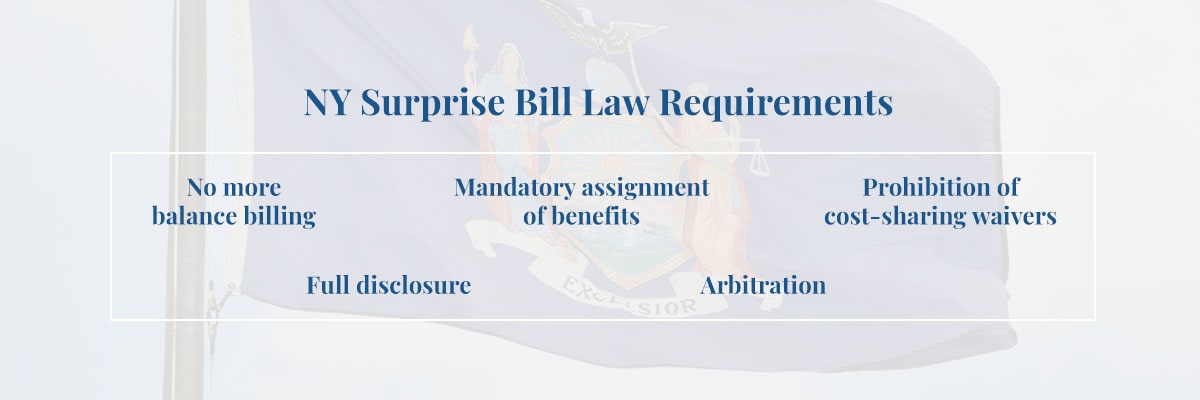Under the New York State Emergency Medical Services and Surprise Bill Act, patients in New York are protected from surprise medical bills when receiving emergency treatment from an out-of-network (OON) health care provider at participating hospitals or ambulatory surgical centers within their health plan’s network. Patients are also protected from surprise billing when a participating physician refers a patient to a nonparticipating provider (out-of-network) and the patient did not consent to treatment by the out-of-network provider.
What Is the NY Surprise Bill Law?
The so-called “No Surprise Bill Law” protects patients in the following situations when a patient receives services from an out-of-network provider at an in-network hospital or ambulatory surgical center and:
(1) a participating doctor was not available; or
(2) a non-participating doctor provided services without the patient’s knowledge or written consent acknowledging that the provider was out-of-network and that the services may not be covered by their plan; or
(3) unforeseen medical circumstances arose at the time the health care services were provided and the patient unknowingly received services from an out-of-network provider, deeming the services “inadvertent.”
NY Surprise Bill Law Requirements
Key provisions under this law include:

- No more balance billing: The practice of balance billing refers to billing patients for OON service charges that exceed their in-network cost sharing obligations (deductible, copayment, and coinsurance). The law prohibits this practice for these types of claims.
- Mandatory assignment of benefits: Patients who sign an assignment of benefits form are not required to pay any amounts over their in-network cost sharing obligations for emergency services, including inpatient services following an emergency room visit.
- Prohibition of cost-sharing waivers: OON providers are not permitted to waive or offer to waive all or part of the deductible, copayment, or coinsurance amount to entice patients to choose to receive medical care from that provider.
- Full disclosure: Providers must notify patients regarding network status, estimated fees, and billing codes before scheduling elective services or nonemergency procedures.
- Arbitration: When OON providers and payors disagree on the reimbursement amount, either party has the right to submit the case for binding arbitration through an Independent Dispute Resolution process.
Contact Us to Receive Legal Assistance
At Cohen Howard, we have been successfully handling surprise bill claims for our clients and have the expertise to evaluate the best pathway for maximizing reimbursements once the Federal No Surprises Act goes into effect beginning January 2022. Having an in-depth understanding of the types of insurance plans and the logistics of how to process claims subject to the State and Federal laws will be necessary to not only optimize payment but to be in compliance with all of the provisions and regulations.
Our team is well versed in the legislation and we are ready to navigate the process for you.
Call us at 732-747-5202 or contact us online to learn more.

